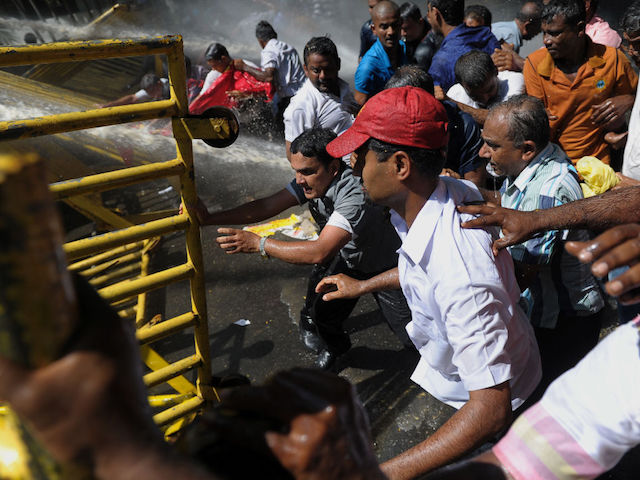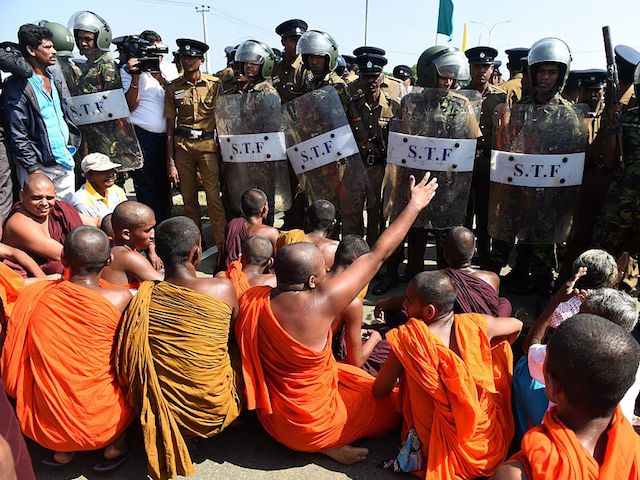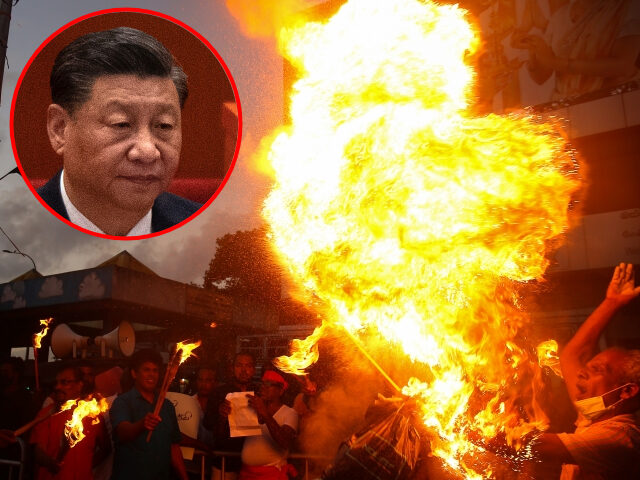Sri Lanka’s ambassador to China Palitha Kohona told the Communist Party mouthpiece Global Times in an interview published on Monday that anyone blaming Beijing’s predatory loans for Sri Lanka’s economic disaster was spreading “convenient propaganda” and that calling China’s Belt and Road Initiative (BRI) a “debt trap” is a “gross exaggeration.”
Kohona told Bloomberg News last week that the island nation was seeking another billion-dollar credit line from China in addition to other financial lifelines as it approaches bankruptcy, effectively guaranteeing that it will not be able to overcome its increasingly insurmountable debts.
The Democratic Socialist Republic of Sri Lanka is currently facing the worst economic crisis in its history, largely the product of three factors: outrageous government spending by the then-ruling socialist Rajapaksa dynasty, taking out irresponsible loans with the Communist Party of China to be used for infrastructure projects that made the country vulnerable to Chinese control, and a failed scheme to ban chemical fertilizers that made the country dependent on imports for food. Sri Lanka is enduring severe shortages of basic foods, medicine, gasoline, other oil products, cooking gas, and nearly every other good required to live comfortably. As Sri Lanka is a socialist country, the government manages purchases of these goods, which means that the country simply ran out of them when the government’s foreign currency reserves were totally depleted.
The shortages have prompted massive nationwide protests that have been ongoing for most of the year, resulting in the expulsion of every Rajapaksa family member – of which there were dozens – in government, most recently the departure of now-former President Gotabaya Rajapaksa this month.
Acting President Ranil Wickremesinghe, who is also serving out his term as prime minister until parliament chooses a president on Wednesday, took over the role after protesters burned down the home of predecessor Mahinda Rajapaksa. Protesters burned down Wickremesinghe’s private home the weekend that Gotabaya Rajapaksa fled the country.
Wickremesinghe told parliament in June that his government’s economy had “completely collapsed.” He lamented that sellers were hesitant to offer Sri Lanka any goods even when the government offered to pay in cash.
Kohona, speaking to the Chinese state propaganda outlet Global Times, admitted that his nation was in a significant crisis, but enthusiastically insisted that rapidly mounting debts to China had no negative impact on the situation.
“Critics from the outside have said our debt problem has been accentuated by these Chinese-funded projects. That’s just convenient propaganda,” Kohona was quoted as saying. “We need to carefully separate fact from simple propaganda. Some foreign media outlets hype the so-called ‘debt trap.’ It is a simple case of looking for any opportunity to be critical of China.”
Kohona addressed the case of the Hambantota port in particular – an expensive infrastructure project under the BRI nominally intended to increase development in a remote southern area of dubious geographical value. The BRI loan used for the project was so expensive that Sri Lanka failed to pay it back, resulting in being forced to sign a deal that gave China complete control over the port for at least 99 years, but potentially up to twice that amount of time.
“Many Western media outlets also called the Hambantota Port a ‘debt trap’ project. This is a gross exaggeration,” Kohona said in the Chinese state media interview. “The funding received from the Chinese lessee of the port was not used to repay the China loans, but was used to repay other loans from other lenders who are not Chinese.”
“I don’t think there is much fact behind that ‘debt trap’ allegation. Another thing to remember is that we now find a large number of ships actually using the port,” Kohona continued, omitting that the ships are using a Chinese-controlled port now, not a Sri Lankan asset. “There are ships that dock at Hambantota Port for bunkering purposes, and business is growing rapidly. No big project of this nature returns a profit within two or three years. Some of them take many years to return a profit.”
Kohona also claimed that government officials “haven’t heard many voices being raised within the country against” the Hambantota project, which is untrue. In 2017, the year that China seized the port, hundreds of protesters demanded Sri Lanka’s government stop accepting economically unviable Chinese investments. Workers’ unions were particularly outraged by the deal, denouncing that giving Chinese companies wide latitude in controlling large infrastructure projects and development would turn the island into a Chinese colony.

Sri Lankan police use water cannons to disperse demonstrators during a protest against the proposed sale of a stake in a loss-making port to a Chinese company in Colombo on February 1, 2017. (ISHARA S. KODIKARA/AFP via Getty Images)

Sri Lankan security personnel and Buddhist monks clash during a protest in the southern port city of Hambantota on January 7, 2017. (SHARA S. KODIKARA/AFP via Getty Images)
The Chinese coronavirus pandemic revived anti-Communist Party protests in Sri Lanka as workers accused the government of allowing imported Chinese workers to make a living on projects while Sri Lankans were banned from working, allegedly to prevent the spread of the virus.
Protesters inquire if Port City is a colony of China. #DailyMirror #SriLanka #PortCityLK 🇱 pic.twitter.com/1fFPHAJgmW
— DailyMirror (@Dailymirror_SL) August 11, 2020
Kohona, the Sri Lankan ambassador to Beijing, expressed no concerns about Chinese investment in his country. On the contrary, the diplomat expressed hope that whoever succeeded Wickremesinghe as Sri Lankan president would continue to invite the Communist Party’s influence on the nation.
“We have developed a strategic cooperative partnership and China is our biggest trading partner and the major investor,” Kohona said. “Hopefully the new government will adhere to these fundamentals and maintain the relationship as it is now.”
Kohona also ominously promised, “BRI investments will continue to be critical to the Sri Lankan economy after the situation stabilizes.”

COMMENTS
Please let us know if you're having issues with commenting.